For me, the idea of 12 hour intermittent fasting does not sound appealing. However, I only recently realized dietary fasting has unintentionally been part of my lifestyle for years now.
And the health benefits of intermittent fasting are definitely worth taking note…

- What is Intermittent Fasting?
- Intermittent Fasting Plans
- #1 16 8 Fasting
- Download our Free Beginner’s Guide
- #2 5 2 Intermittent Fasting
- #3 Eat Stop Eat (24 hour fast one day a week)
- #4 Alternate Day Fasting
- #5 12 Hour Intermittent Fasting (Our favorite method!)
- Download our Free Beginner’s Guide
- What are the Health Benefits of 12 Hour Intermittent Fasting?
- Modern Physicians are Incorporating Fasting Protocols Into their Diet Recommendations
- But Intermittent Fasting Is Nothing New!
- Download our Free Beginner’s Guide
- BIG Health Benefits of 12 Hour Intermittent Fasting
- Download our Free Beginner’s Guide
- 3 Quick Steps to Incorporate 12 Hour Fasting Into Your Day
- How to Begin and Maintain 12 Hour Intermittent Fasting
- Download our Free Beginner’s Guide
TABLE OF CONTENTS:
- Definition of Intermittent Fasting
- 5 Popular Intermittent Fasting Methods
- Quick History Lesson from Plato and Hippocrates
- 6 BIG health benefits of Intermittent Fasting
- 3 Steps to incorporate a 12 Hour Intermittent Fasting
- How to Begin and Maintain a 12 Hour Intermittent Fasting Schedule
What is Intermittent Fasting?
Intermittent fasting is an eating method that goes between fasting and eating on a consistent schedule. It is proven that intermittent fasting is beneficial in so many ways. Such as, enhanced detoxification, managing your weight and so many more.
Intermittent Fasting Plans
Here are 5 different intermittent fasting plans that can help you create the perfect intermittent fast method for your life. Fasting can make a big impact on your health, digestion and more. Keep reading for the big health benefits of intermittent fasting.
NOTE: Be sure to check with your doctor before you begin intermittent fasting. Once you get the approval, introducing the practice is simple.
#1: 16 8 Fasting
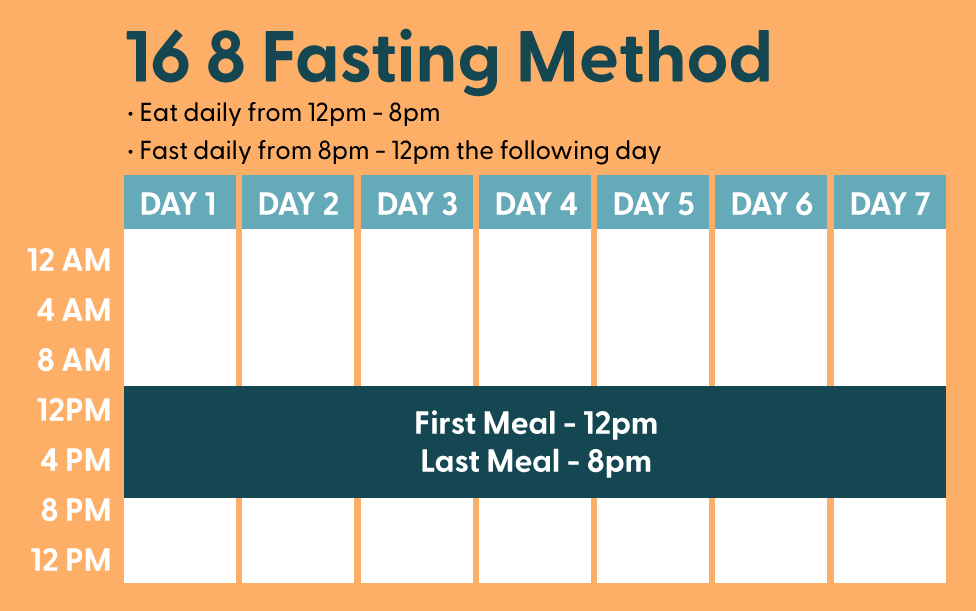
The 16 8 Fasting Method consists of eating all of your calories within an 8 hour window each day. Within this 8 hour window, it’s suggested that you squeeze in 2-3 meals.
In simple terms, you stop eating immediately following dinner and then skip breakfast the next day. For example, if you finish your last meal in the 8 hour window, then you don’t eat again until 12pm the next day. This establishes the 16 8 Fasting Method.
How to Begin 16 8 Fasting
For people that get hungry first thing in the morning, this 16 8 Fasting schedule may be a bit tough to embrace. My suggestion is to push back the morning window by 30 minutes every day or two until you’re comfortable waiting until 12pm to begin your 8 hour eating window.
You can also consider drinking water, coffee and other drinks that have no calories. This does help reduce the feelings of hunger and make it a little easier to transition.
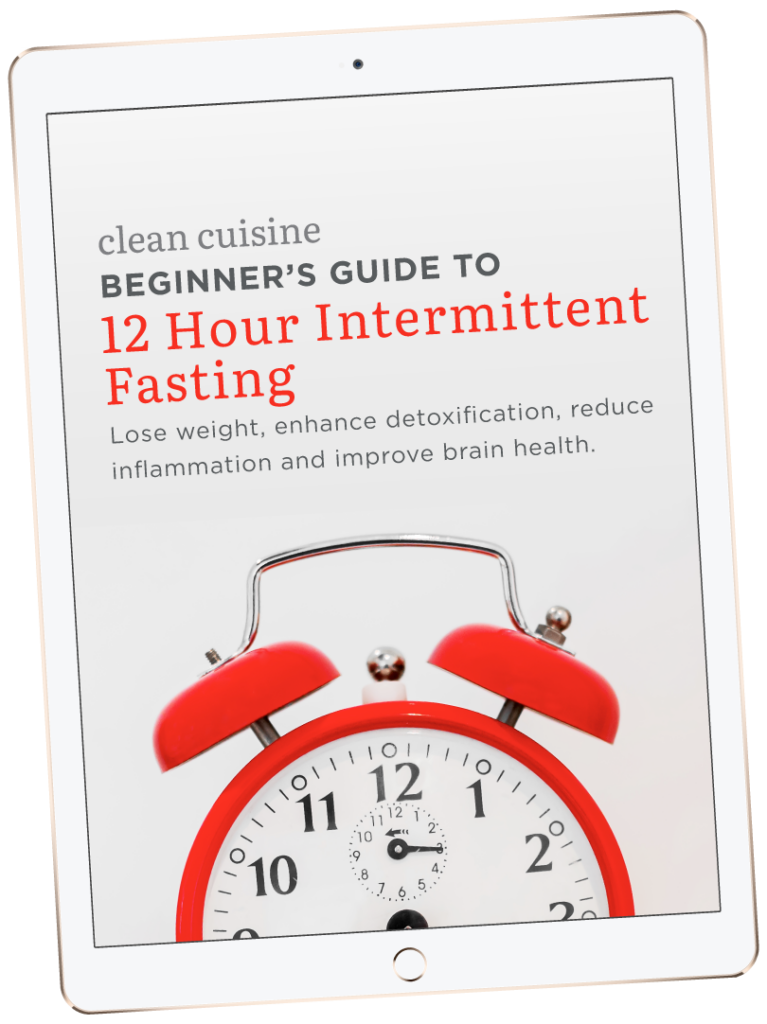
Download our Free Beginner’s Guide
Use this Clean Cuisine 12-page Guide to jump-start your Intermittent Fasting journey!
What to Eat During the 16 8 Fasting Window
It is highly recommended that you eat healthy, whole foods. We encourage anyone that asks, to adopt a clean eating diet plan. The 8 hour window is not intended for you to slam excessive calories or poor food choices.
16 8 Fasting for Women
I’ve read numerous studies that women should not fast beyond 14-15 hours in order to best support their hormones and metabolisms. So, we don’t encourage women to take on a 16 8 Fasting method.
Our 16 8 Fasting Method Conclusion:
The 16 8 Fasting method is best suited for men that eat healthy and want to establish the health benefits from fasting 16 hours and eating their daily caloric intake in 8 hours a day.
Yes, the way I am describing this, it seems simple in theory. However, I have tried this method before and as a woman, it did negatively adjust my hormones and reduced my metabolism. Carefully consider 16 8 Fasting and work with your doctor before embracing this method.
#2: 5 2 Intermittent Fasting
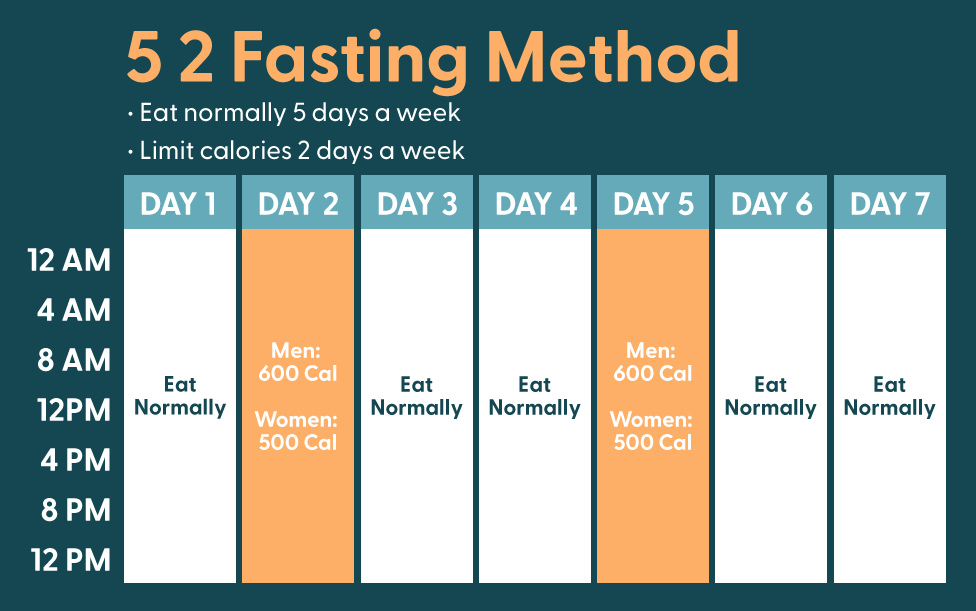
The 5 2 Intermittent Fasting method adopts 2 days a week of limited calories and 5 days of eating normally. On those 2 days of limited calories, it’s encouraged that men consume 600 calories for those days and women consume 500 calories.
How to Begin 5 2 Intermittent Fasting
You will begin by eating normally for 5 of the days each week. By eating normally, we encourage you to eat a clean, healthy diet that is filled with whole foods, healthy meats and pastured eggs.
For the 2 fasting days, you will eat 1 meal consisting of 600 or 500 (men and women respectively) or 2 meals each day consisting of 300 or 250 calories each.
Again, you can also drink water, coffee and other drinks that have no calories.
What to Eat on a 5 2 Intermittent Fast
Limiting calories on those 2 days makes it tough to create sustainable meals. Be sure to follow a clean, whole foods diet during the 5 days of eating normally. Then, choose balance whole foods such as: raw fruits and vegetables to help your stomach stay full longer. Pair this with fiber, such as oatmeal and plant-based proteins like flaxseeds and hemp seeds. A big green smoothie is also helpful.
You can also consider drinking water, coffee and other drinks that have no calories. This does help reduce the feelings of hunger and make it a little easier to transition.
Embracing the 5 2 Intermittent fasting method still reaps the health benefits of intermittent fasting.
#3: Eat Stop Eat (24 hour fast one day a week)
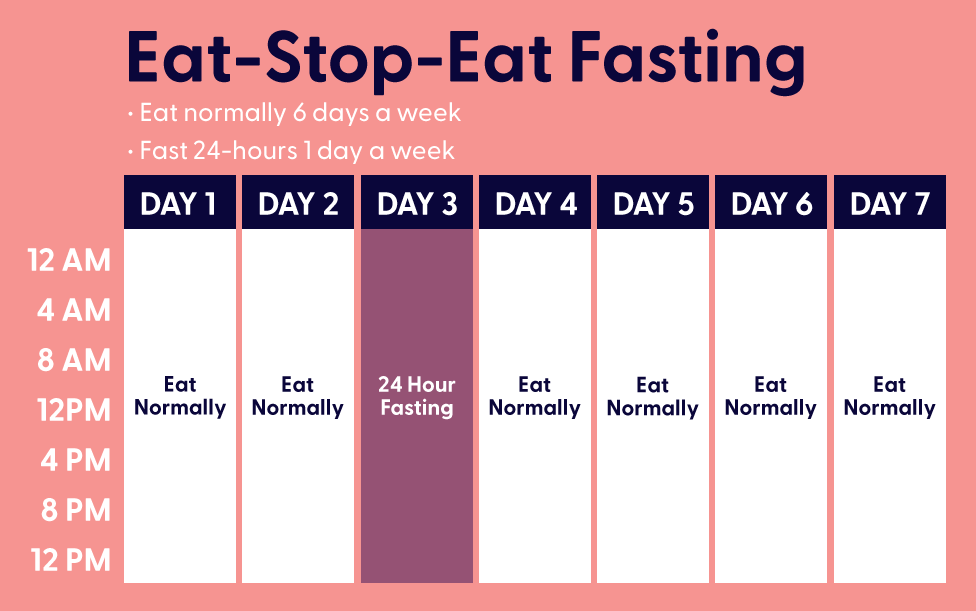
Brad Pilon shares in his book the 24 hour fast benefits and methods of Eat Stop Eat. He teaches a 24 hour fast once per week is a lifestyle that will help most people burn through the glucose they have stored in their bodies. While subsequently transitioning to using fat as an energy source instead.
During the week, you would eat normally 6 days a week and then do a 24 hour fast 1 day a week.
24 Hour Fast Benefits
The 24 hour fast benefits of 1 day a week will also provide you all of the healthy benefits of intermittent fasting. However, eat stop eat intermittent fasting is not easy to embrace and we encourage you to be mindful and ease into a fast this long.
#4: Alternate Day Fasting
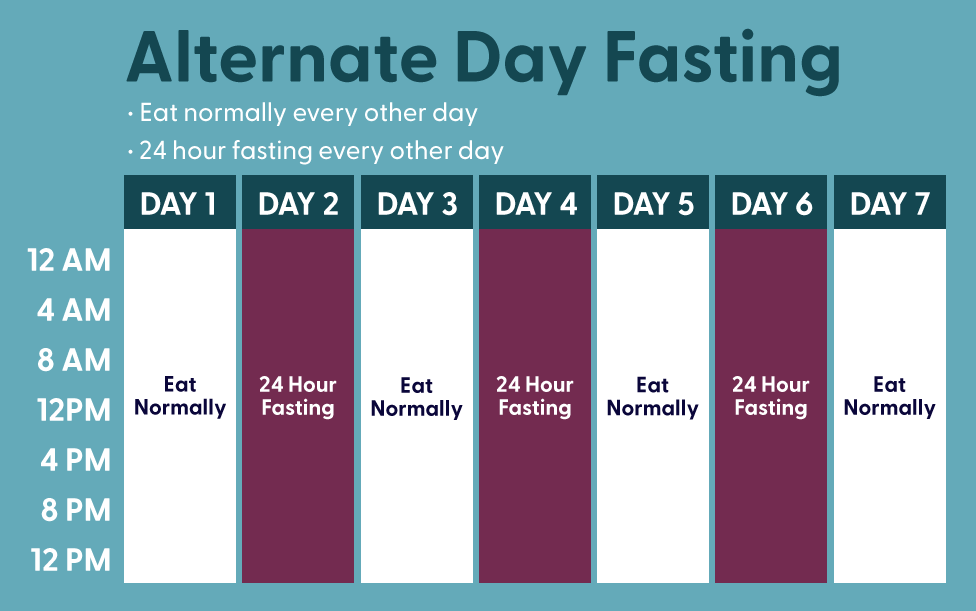
We suggest that you get comfortable with the eat stop eat method above before attempting alternate day fasting. There are several versions of alternate day fasting methods, but the 24 hour fasting method is the most common.
Again, if you’ve not intermittent fasted before, be mindful that this alternate day fasting is not for beginners and should be considered seriously.
Alternate Day Fasting Schedule
The alternate day fasting schedule consists of alternating between a full 24 hour fast and eating normally. This type of fasting is a bit extreme and should be used with cautious and under a doctor’s care.
#5: 12 Hour Intermittent Fasting (Our favorite method!)
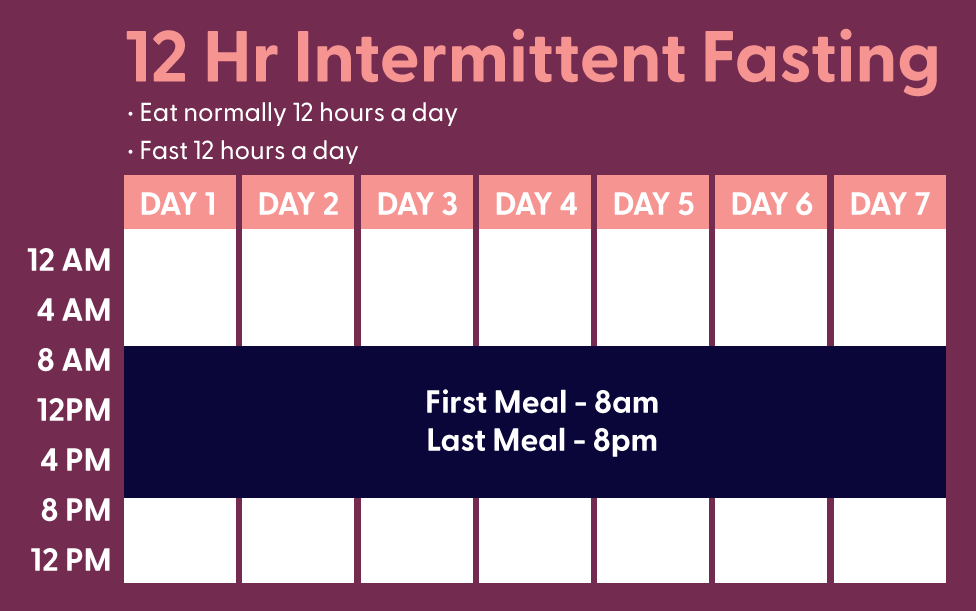
Truthfully, the first 4 fasting plans do not sound at all that desirable to me. However, 12 hour fasting is a different story.
12 Hour Intermittent Fasting Schedule
The 12 hour intermittent fasting schedule feels the easiest, least painful and most natural method of fasting. If your last meal ends at 8pm, your next meal does not begin until 8am. If you eat a late evening snack at 10pm, then you don’t eat your next meal until 10am.
This method of 12 hour intermittent fasting is flexible, much better for women’s hormones and metabolism balances. Plus, you get all of the health benefits of intermittent fasting.
Easier Intermittent Fasting Plan
In my opinion, 12 hour fasting is the easiest and least painful way to go about fasting. If you are following an otherwise nutrient dense clean eating diet, it should actually be easy to do.
Truly, if you’re interested in embracing intermittent fasting, this 12 hour intermittent fasting plan is the most pleasant way to go.
As mentioned, I have been doing it more or less by accident for years.

Download our Free Beginner’s Guide
Use this Clean Cuisine 12-page Guide to jump-start your Intermittent Fasting journey!
What are the Health Benefits of 12 Hour Intermittent Fasting?
For much of human history, sporadic access to food was likely the norm, especially for hunter-gatherers. Fasting to improve health dates back thousands of years, with Hippocrates and Plato among its earliest proponents.
Although the idea of eating five or six small meals throughout the day has been popular among dieters, if you think about it, it is highly unlikely that people who lived 1000 years ago were eating three meals a day plus snacks.
Science is now starting to agree that keeping your stomach filled to the brim with food all day long might not be the healthiest thing to do after all.
More recently, fasting diets are starting to gain popularity among mainstream doctors and scientists.
Modern Physicians are Incorporating Fasting Protocols Into their Diet Recommendations
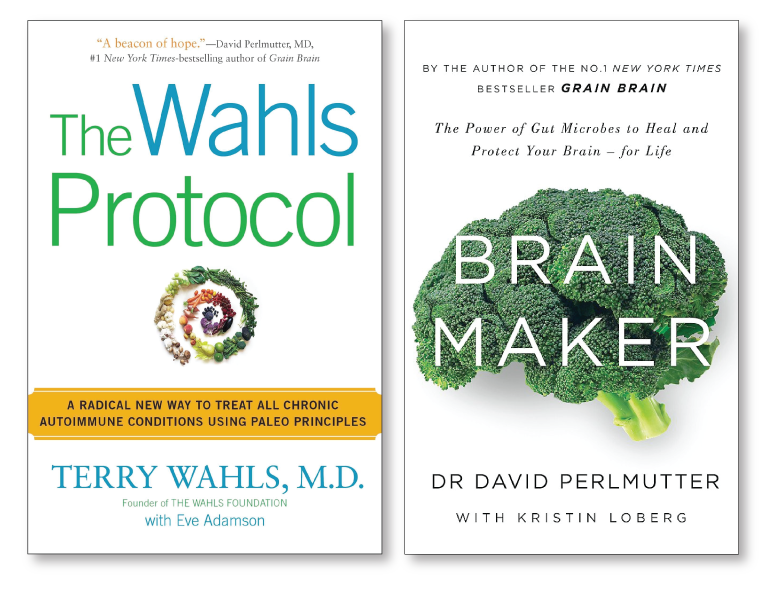
Two doctors I highly respect, Terry Wahls, M.D. and David Perlmutter, M.D., both recommend fasting in their most recent books, The Wahls Protocol and Brain Maker (see photo above.)
But Intermittent Fasting Is Nothing New!
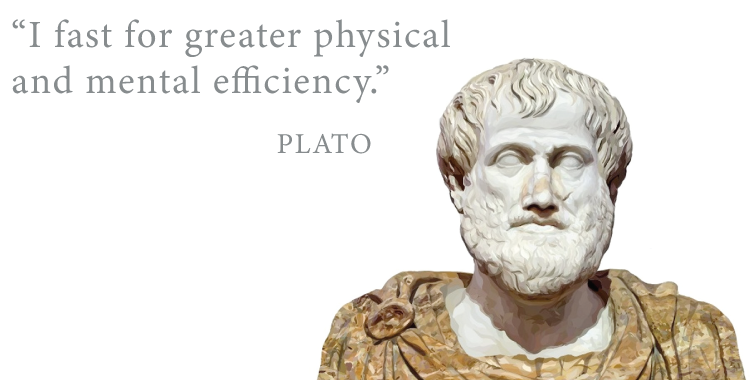
“There is nothing new, except what has been forgotten.” – Marie Antoinette
“The best of all medicines is resting and fasting.” – Benjamin Franklin
“Everyone has a physician inside him or her; we just have to help it in its work. The natural healing force within each one of us is the greatest force in getting well. Our food should be our medicine. Our medicine should be our food. But to eat when you are sick is to feed your sickness.” – Hippocrates

Download our Free Beginner’s Guide
Use this Clean Cuisine 12-page Guide to jump-start your Intermittent Fasting journey!
BIG Health Benefits of 12 Hour Intermittent Fasting
There is good research to support a number of different health benefits of 12 hour intermittent fasting. You don’t need to avoid food for days on end to reap the benefits either! Here are some of the benefits of 12 Hour Intermittent Fasting.
#1: Improved Brain Health from 12 Hour Fasting
12 Hour Intermittent Fasting has been shown to support mitochondrial health and anything that supports mitochondrial health also improves brain health.
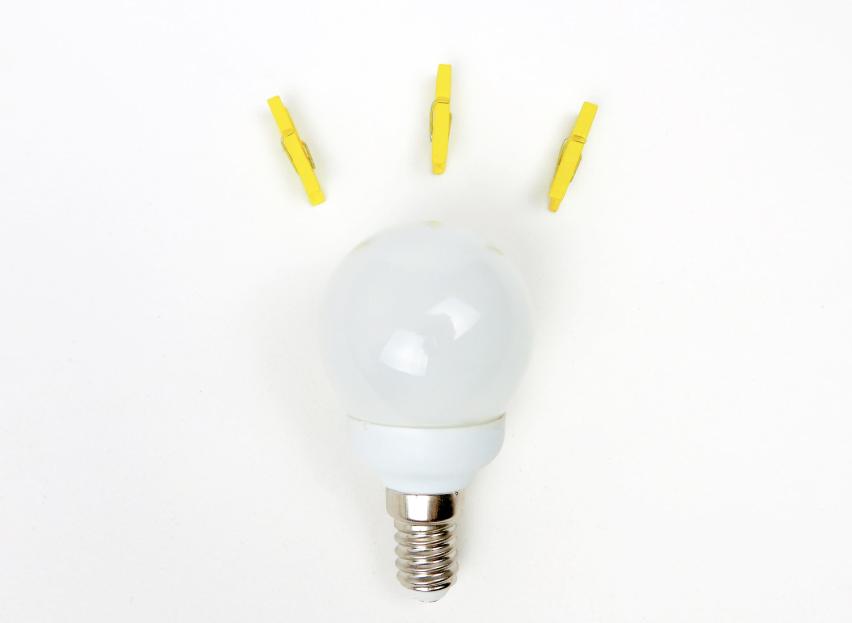
According to research published in Dr. Wahls book, there is even some evidence that intermittent fasting may reverse progressive brain disorders.
#2: Enhanced Detoxification.

Your body is constantly trying to detoxify itself 24 hours a day. The body uses a great deal of energy to detoxify, but it also uses a great deal of energy to digest food. When your body is not busy digesting food, it can focus its energy on eliminating toxins and healing.
Giving your body time to focus solely on cellular repair through the process of 12 hour intermittent fasting can be incredibly beneficial for optimizing detoxification.
#3: Reduced Inflammation by Intermittent Fasting
Intermittent fasting can help reduce your body’s overall inflammation. This is done through enhanced detoxification.

12 Hour Intermittent Fasting “turns on” the NRF2 gene pathway, which not only produces a dramatic increase in antioxidant protection and enhanced detoxification, but also decreases inflammation.
#4: Weight Loss / Weight Management from Fasting
In general it takes between 6 to 8 hours for the body to burn through its glycogen supply. When glycogen is depleted the body will then turn to the energy stored in fat cells.
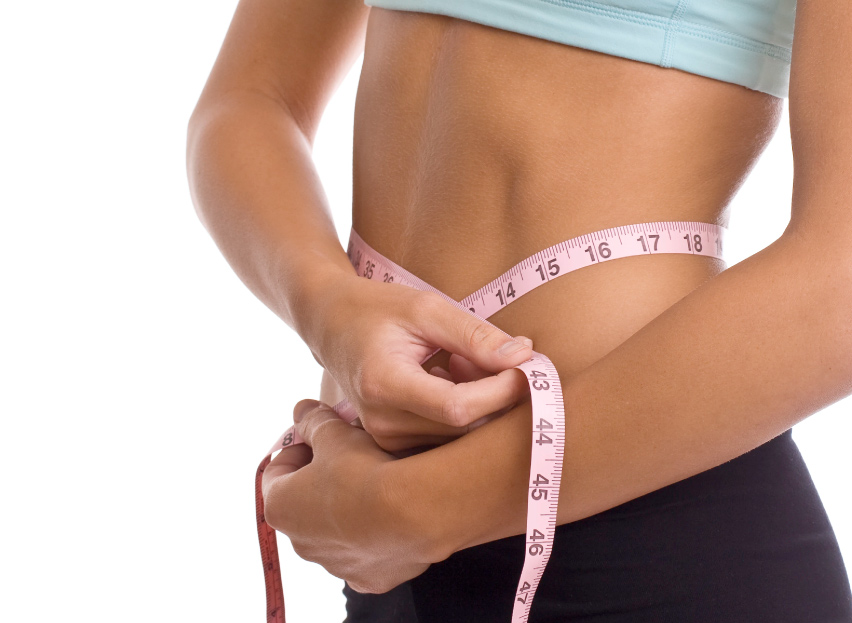
Eating throughout the day makes it much harder for the body to burn fat. Extending the time between eating with 12 hour intermittent fasting will force your body to tap into stored fat reserves.
(Since writing this post, I’ve learned so more benefits of Intermittent Fasting that I wanted to pass onto you.)
#5: Improved Workouts Thanks to Intermittent Fasting
According to PubMed, training with limited carbohydrate availability can stimulate adaptations in muscle cells to facilitate energy production via fat oxidation.

Which means, when you workout during the fasting window of your 12 hour intermittent fasting, your body gets better at burning fat for energy since there are no foods to pull from.
#6: Intermittent Fasting Can Help You Live Longer
Scientists have known for a long time that restricting calories can lengthen life. Intermittent fasting activates many of the same mechanisms for extending life as calorie restriction does.

Even Plato in 420 BC and Hippocrates in 460 BC were writing about fasting.

Download our Free Beginner’s Guide
Use this Clean Cuisine 12-page Guide to jump-start your Intermittent Fasting journey!
3 Quick Steps to Incorporate 12 Hour Fasting Into Your Day
If you want to try incorporating a 12 hour intermittent fast into your day, you’ll need to follow these important considerations:
Step #1: Leave at least 12 hours between your evening meal and your morning meal. This is called “12 hour fasting”.
In other words, if you typically eat dinner at 7 pm then you will want to wait until at least 7 am before having anything else to eat. This will leave a break of a 12 hour fast in between your eating schedule.

Step #2: Eat a nutrient-dense diet and have stable blood sugar
I should point out though that if you are new to clean eating, you may find it very difficult to go for long periods of time between meals.
Before I changed my diet, I distinctly remember how I not only always needed an after dinner snack, but I would wake up in the morning ravenous.
Step #3: Make sure that you can go long stretches without eating and still be comfortable.
And speaking of feeling comfortable, I am not at all hungry during the dinner-breakfast “fasting” window either. I don’t think it’s a good idea to ever eat when you are not hungry, but I also think it is a bad idea to let yourself be miserable and hungry for hours on end too.

Having said that, I do think if you are eating a nutrient dense diet and a solid and healthy dinner, you should find it rather easy to do a 12 hour fast. You could potentially be doing your body a big favor too!

How to Begin and Maintain 12 Hour Intermittent Fasting
Here are three ways to begin and maintain a healthy intermittent fasting routine. However, I have also shared the one main reason why 12 hour fasting may not work for you.
#1: Start Slow! Take Your Time to get to a Full 12 Hour Fast
There is no reason you need to start out fasting for the full 12 hours. This is not a sprint, it’s a marathon. It takes time for your body to adjust to not eating especially if you typically have an evening snack or grab breakfast right when you wake.
For me, I typically take my evening supplements around 9pm. Then, I wake up slow and take my time getting ready in the morning.
#2: Your Body Will Adapt – Give Your Body Time to Acclimate
When are you first starting out, you may experience some hunger pains. This is because you taught your body that you are going to feed it first thing in the morning. If you extend intermittent fasting by 20-30 minutes a day, within a few weeks you can extend your fasting period from 8-9 hours to the 12 hour fasting window.
Same things happens in the evening. Perhaps you have taught your body that when you sit down to relax after dinner, you like to have something sweet to eat. By reducing this back by 20-30 minutes a day, you can optimize your 12 hour intermittent fasting window.
#3: 12 Hours of Feeding + 12 Hours of Fasting
You have to decide when to start fasting, add 12 hours and then starting feasting. I tend to go with the 9pm – 9am fasting period and sometimes, will extend my morning by 1-2 more hours a few times a week.
This helps to keep my body guessing when I am going to feed it, which helps my focus and prolonging the detoxification process.
BUT… 12 Hour Fasting May Not Work
If you are anything like I was with hormone issues, gut imbalances, sleep issue, a liver needing detoxed or any vitamin deficiencies, 12-hour Intermittent Fasting may not work for you.
I always suggest to anyone interested in implementing a 12-hour Intermittent Fasting schedule, to get their bloodwork and labs. This helps to ensure your body is in optimal shape to change your diet.
Consider the following labs: hormones (thyroid, cortisol, estrogen, testosterone) along with vitamins and minerals.
If your lab results show an imbalance, check out a few articles at Clean Cuisine to get you back to optimal health so you can begin taking advantage of all of the 12-hour Intermittent Fasting benefits.

Download our Free Beginner’s Guide
Use this Clean Cuisine 12-page Guide to jump-start your Intermittent Fasting journey!
Have You Experimented with 12 Hour Intermittent Fasting?
If so, please be sure to leave a comment and let me know how it has worked for you!




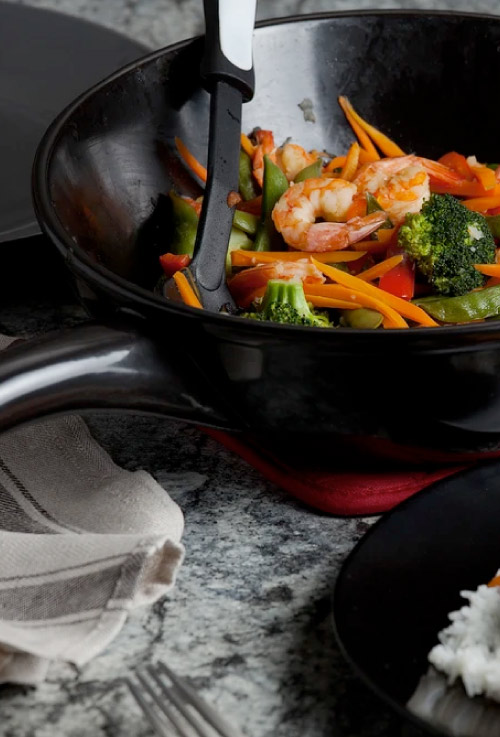

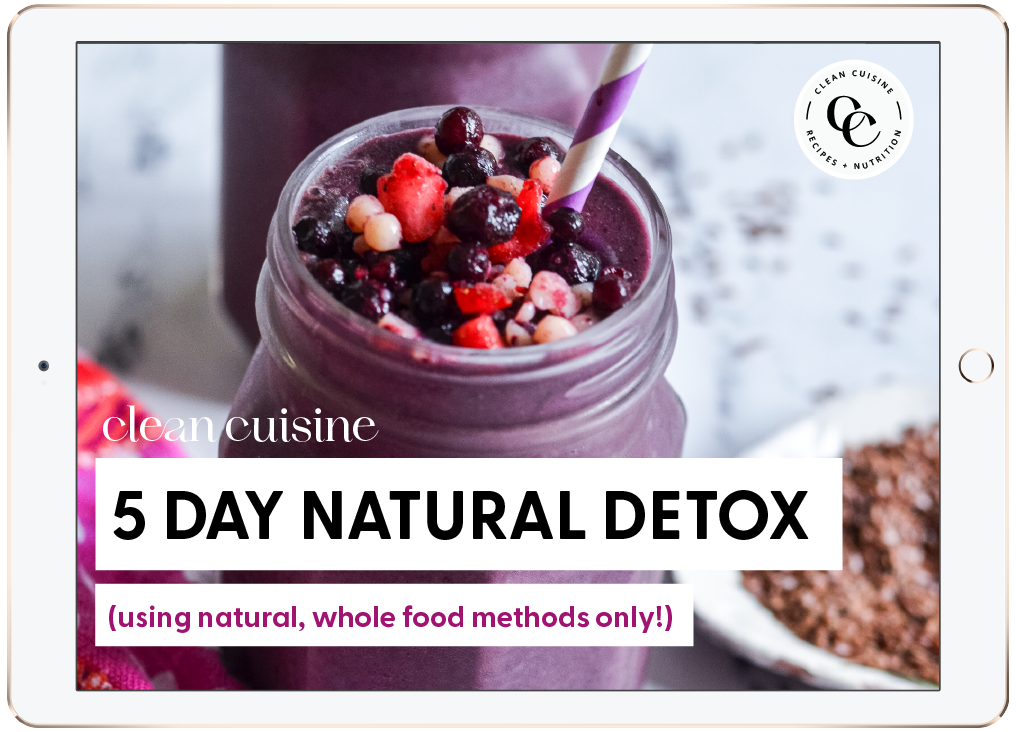

Susan
Sunday 18th of June 2023
Sorry- In my previous comment about bulletproof coffee, I meant to write: medium chain triglyceride (MCT) oil, such as that derived from coconut oil.
Aimee Niedosik
Wednesday 5th of July 2023
Susan, Anything with calories breaks a fast -- including bulletproof coffee and MCT's. While fasting we recommend non-caloric items only such as black coffee and water.